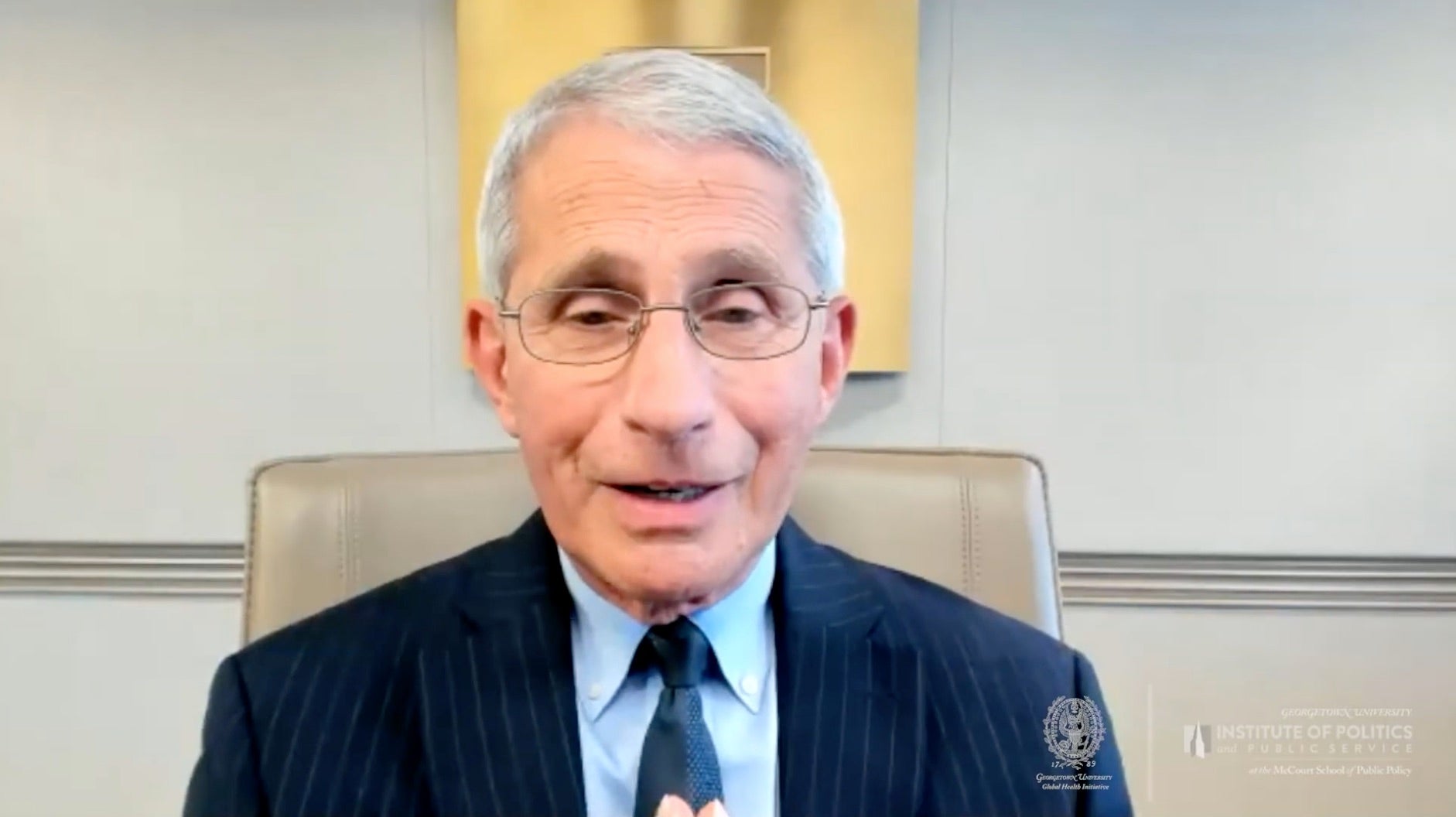Fauci to Georgetown Students: ‘Trust Respected Medical Authorities’
Georgetown students got the rare chance to ask questions and virtually engage with Dr. Anthony Fauci, the top infectious disease researcher in the country.
More than 135,000 people tuned in to the live virtual event yesterday, co-sponsored by Georgetown’s Global Health Initiative, the Institute of Politics and Public Service at the McCourt School of Public Policy (GU Politics), the O’Neill Institute for National and Global Health Law and the Kalmanovitz Initiative on Labor and the Working Poor.
CNN’s Jim Acosta reported on the conversation live from the White House Rose Garden.
‘Historic Proportions’
“This is a pandemic of historic proportions,” said Fauci, director of the National Institute of Allergy and Infectious Diseases and a member of the White House Coronavirus Task Force. “It’s something that I think when history looks back on it, it will be comparable to what we saw in 1918.”
John Monahan (C’83, L’87) of Georgetown’s Global Health Initiative and GU Politics’ Mo Elleithee (SFS’94) moderated the discussion, which included an overview of the current state of the pandemic, vaccine development, protecting vulnerable populations and more.
Elleithee asked Fauci how citizens could find reliable information, given the quickly evolving nature and the growing number of misinformation and disinformation that has been disseminated.
Trusted Authorities
“For the most part, you can trust respected medical authorities. I believe I am one of them,” said Fauci, a graduate of Jesuit schools – Regis High School and College of the Holy Cross. “I would stick with respected medical authorities who have a track record of telling the truth, who have a track record of giving information and policy and recommendations based on scientific evidence and good data.”
Fauci also explained to the students that while young people may not follow guidelines because they may have lower chances of getting infected than vulnerable populations, that line of thinking is what spreads the pandemic and “is part of the problem and not the solution.”
“Think about your societal responsibility,” Fauci said. “We are all in this together. Everybody has a place and role in getting this outbreak under control.”
‘Stick to the Science’
School of Foreign Service graduate student April Lenhard (G’21) asked Fauci how he balances the current divisive political environment with the need to disseminate serious information about the virus.
“Stick to the science and stick to the evidence,” Fauci replied. “If you want to get a message across, build up the confidence in others that you are speaking the truth and you are speaking and advising on the basis of evidence and science.”
Caleb Yip (SFS‘21) asked Fauci for insight on the World Health Organization’s (WHO) response and what his thoughts were on the current administration’s submitted plans to withdraw.
“The world does need a WHO for outbreaks like this and even for the general health of the globe to coordinate it,” he said.
Addressing Health Inequities
Quentin Levin (C’21), a contact tracer this summer, asked Fauci what steps policymakers should consider when distributing the vaccine to avoid magnifying existing social and geopolitical inequalities.
Fauci said the general principle is to give the vaccine to those who are most vulnerable and would benefit most, such as first responders, healthcare providers, essential members of society, and people with underlying conditions.
“Hopefully you could quickly get everybody vaccinated or get the therapy to everybody who needs it, but sometimes you have to make difficult decisions,” Fauci explained. “That’s the reason why you want to go by the strongest medical and ethical principles to guide you.”
In response to a question from Claire Cushman (C’22) about the pandemic’s disproportionate impact on poor communities and communities of color, Fauci said that one thing the federal government can do now is concentrate resources to increase access to testing and health care in the communities most affected.
In the long term, Fauci said it requires a decade-long commitment to address and eliminate health disparities.
Immunity, Vaccine Development
Several students asked questions related to building immunity and vaccine development.
On the topic of immunity, Fauci explained that if a person is infected and recovers it is likely that the immune system eliminates the virus, but no one knows how long that immunity will last. He later mentioned that studies are currently underway to examine whether getting the infection a second time could lead to enhanced or worse symptoms.
Fauci said vaccine development is on a “good track” and is cautiously optimistic that if progress continues as predicted, it is possible that by the end of this year or the beginning of 2021, the medical community will have enough information to know whether the vaccine candidates are safe and effective.
“No vaccine is going to be 100% protective,” said Fauci in response to a question about the specific timeline for vaccine development and wide distribution.
Fauci went on to explain that the hope is that with a combination of people already exposed and a vaccine that is anywhere from 70-75% effective there will be enough herd immunity and people will not have to worry as much about infection.
Watch the full discussion here , and follow @GUPolitics and @GUGlobalHealth on Twitter to stay up to date on future conversations.
